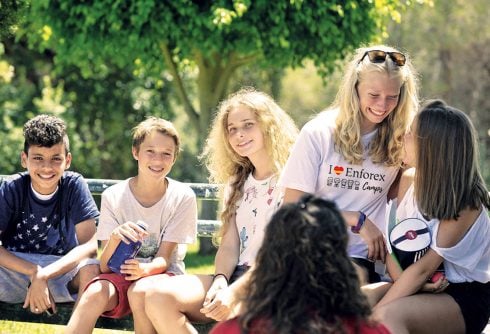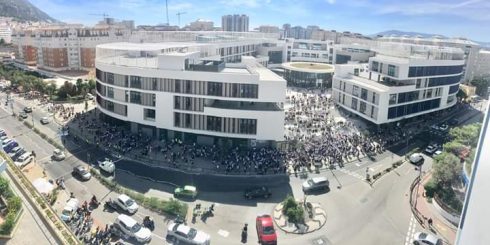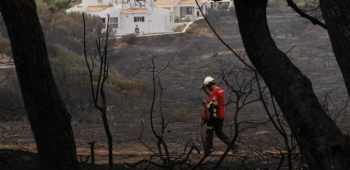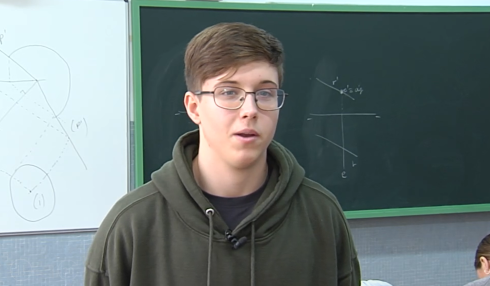JOSE Manuel is showing me his lovingly-cultivated vegetable patch.
The green-fingered teen and his team of junior gardeners have studiously plucked every weed from the surrounding soil and ingeniously reinvented the husks of old computers as plant pot holders.
There are even stripped out toilets serving as feeder beds.
“We grow everything for the kitchen here, and all the herbs – thyme, rosemary, mint,” he tells me as we walk past neat rows of young green lettuces and plump cauliflowers.
He seems no different to any lively 15-year-old. But unlike other kids, Jose Manuel will not be going home after school to tell Mum and Dad how his day went.
He is one of 61 pupils living and studying at La Residencia Escolar San Isidro Labrador in Los Barrios during the week, where the only ‘entry qualification’ is a troubled background.
For now, his classmates and six teachers are his closest ‘family’.
One of 63 special needs schools in Andalucia funded by the Junta, the residencia welcomes pupils aged six to 20 from all over the Campo de Gibraltar and even further afield.
Most are referred by social services and come from deeply deprived families or dysfunctional homes. All have their own heartbreakingly sad story. And many are really heart-wrenching.
Most of them are able to go home at weekends (although ‘at least half’ would prefer not to), but when they go back for holidays, particularly the long one in the summer, they mostly come back withdrawn and traumatised due to their incumbent family problems.
“It takes us many weeks to get them back on an even keel,” says school secretary Miguel Martinez, 37, a qualified PE teacher, from Granada.
“And most of them are very sad when they have to go home for their summer holidays with plenty of tears. It is heartbreaking.”
 It is all indicative of the high unemployment and attendant social problems that have ravaged this part of Spain more than any other and, such is the demand for places, many children are turned away.
It is all indicative of the high unemployment and attendant social problems that have ravaged this part of Spain more than any other and, such is the demand for places, many children are turned away.
But since the school opened 48 years ago, the teachers at San Isidro Labrador have created a safe environment where hundreds of children have flourished.
“It’s really like a family here,” continues Miguel, a father-of-two, who has been working at the school for five years.
“It’s incredible to see the transformation of these children after they have spent time here.”
From Monday to Friday, pupils stay and sleep on the premises, with the day divided into activities designed to boost confidence and develop life skills.
The children wake up at 8am for breakfast before starting their school day, which takes place at a normal comprehensive next door. Any problems at school, health, disciplinary or otherwise and one of the staff from San Isidro deals with it.
“I’m often called to take someone to see a doctor or deal with an emotional outburst or something or other,” continues Miguel, a father-of-two, who has been working at the centre for five years.
After lunch, between 4 and 6pm, homework is the priority; and after 6.30pm pupils explore their interests through workshops in everything from English and cookery to handicrafts and horticulture.
Later in the evening, they can watch films or football matches before bedtime at 10pm.
“Their day here has a routine so they develop good habits – eating the right things, sleeping at the right time, and learning,” explains Miguel.
“We want to give them the basic skills needed to enter the job market or to go into business when they are older.”
Miguel leads me into the school workshop where 11-year-old triplet Laura is hard at work pressing metal badges. She presents me with a beautifully-designed bespoke ‘Olive Press’ badge and a beaming smile.
Along with baking biscuits, badge-making is one of the school businesses that the kids run themselves, raising funds by taking orders and selling their wares to fellow pupils, friends and the local community.
“It is a great way for them to learn commercial enterprise,” explains Miguel. “We encourage basic commerce and monitor it carefully. It is great for their self-esteem.”
A classic example is Laura, whose sisters Elena and Marta also attend the school. She is one of five appointed ‘commercial directors’, taking orders for biscuits and badges.
 (Among the children, there is also a ‘president’, an ‘accountant’ and a ‘head gardener’).
(Among the children, there is also a ‘president’, an ‘accountant’ and a ‘head gardener’).
However, despite her sales skills, confident, clearly clever Laura has her mind set on a different career path.
“When I’m older I’d like to be a vet because I love animals,” she confides.
“I like it here because you can make lots of friends and learn a lot.”
The children respond to the business-like structure, Miguel explains.
“If they are good in activities other than studying, then it makes their self-esteem go up.
“These workshops suit them because they develop skills and talent in one or other of the activities.”
A heavenly aroma of baking entices us down to the kitchen where a busy brigade of young commis chefs is receiving instruction from head cook, Petra Robles Valera. She also prepares breakfast and lunch from Tuesday to Friday. Today she’s helping the kids to make tarta de aceite, magdalena cupcakes and chocolate and orange biscuits which they will then sell on to pupils from the organisation’s four other nearby schools.
One of her helpers is 15-year-old Manuel from La Linea. He has been based at the school for six years and holds two prized positions – ‘chief accountant’ and ‘social media boss’, responsible for Facebook and YouTube uploads.
 “The food here is always great and we can watch the football on TV here,” chips in 14-year-old Felicísimo, a Real Madrid fan from La Linea.
“The food here is always great and we can watch the football on TV here,” chips in 14-year-old Felicísimo, a Real Madrid fan from La Linea.
“And we do lots of nice things. I really liked going to the cinema to see Star Wars, and once we went on a trip to Sevilla.”
The infrequency of such excursions is one aspect Miguel would like to improve, as trips to new places help to broaden the children’s horizons.
“There is a shortage of money, so the kids can’t travel much,” he says sadly.
“Perhaps if somebody could donate a bus for the day we could take them somewhere a bit more often.”
Finances are an ongoing problem made worse by Spain’s savage economic crisis which has given the province of Cadiz a particularly hard time.
“We don’t have enough places now. We get lots of applications, and we have to turn plenty away,” says Miguel.
 But the dozens of smiling little faces I saw at San Isidro represent a triumph of hope over adversity. And their happiness is a tribute to the remarkable devotion of the staff.
But the dozens of smiling little faces I saw at San Isidro represent a triumph of hope over adversity. And their happiness is a tribute to the remarkable devotion of the staff.
Later that evening, we join Miguel to watch a Real Madrid game in Estepona, near where he lives.
Suddenly, a little boy in full Los Blancos kit comes bounding up to Miguel and gives him a huge hug.
He’s a former San Isidro pupil, it turns out, now happily back home living with his mum after completing three successful years at the school. You literally couldn’t make this up and, even better, he disappears, returning five minutes later with his older sister, also a former resident, who also shares beams and hugs.
Their mother is running a bar around the corner, having rebuilt her life following a family crisis.
It’s good to be home with mum, but La Residencia Escolar San Isidro Labrador, their old alma mater, will always have a place in their hearts.
To get in contact to order badges or to perhaps sponsor a coach trip pls contact Miguel at [email protected]











